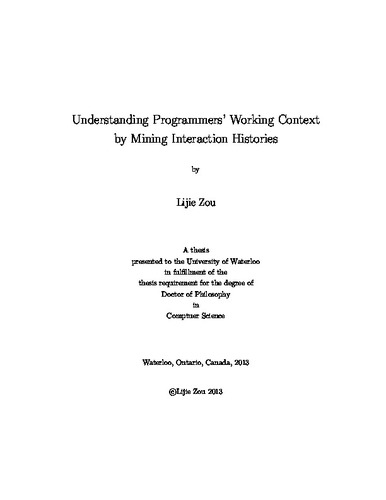| dc.description.abstract | Understanding how software developers do their work is an important first step to improving their productivity. Previous research has generally focused either on laboratory experiments or coarsely-grained industrial case studies; however, studies that seek a finegrained understanding of industrial programmers working within a realistic context remain limited. In this work, we propose to use interaction histories — that is, finely detailed
records of developers’ interactions with their IDE — as our main source of information for understanding programmer’s work habits. We develop techniques to capture, mine, and analyze interaction histories, and we present two industrial case studies to show how this approach can help to better understand industrial programmers’ work at a detailed level: we explore how the basic characteristics of software maintenance task structures can be better understood, how latent dependence between program artifacts can be detected at interaction time, and show how patterns of interaction coupling can be identified. We also examine the link between programmer interactions and some of the contextual factors of software development, such as the nature of the task being performed, the design of the software system, and the expertise of the developers. In particular, we explore how task boundaries can be automatically detected from interaction histories, how system design
and developer expertise may affect interaction coupling, and whether newcomer and expert developers differ in their interaction history patterns. These findings can help us to better reason about the multidimensional nature of software development, to detect potential problems concerning task, design, expertise, and other contextual factors, and to build smarter tools that exploit the inherent patterns within programmer interactions and provide improved support for task-aware and expertise-aware software development. | en |

